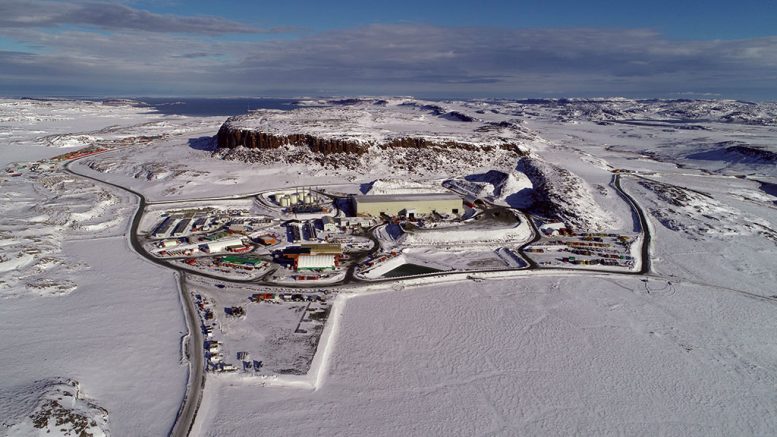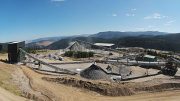Even before COVID-19 had been declared a pandemic, the mining industry in Canada’s northern territories was facing challenging circumstances. The ongoing protectionist trade wars were leading to lower commodity prices, and the impact on potential mine closures and decreased exploration expenditures was becoming more dire.
According to preliminary figures released in February by Natural Resources Canada, exploration and deposit appraisal expenditure estimates for the North were projected to fall dramatically in 2020. Total expenditures in the Northwest Territories were forecast to drop 14.2% to $52.1 million, while Yukon was expected to see a 29.9% drop to $97.9 million, and Nunavut was forecast to see expenditures fall by 6.1% to $117.9 million. Even more startling was the fact that the Northwest Territories and Yukon have not seen this lack of investment in more than a decade.
And that was before COVID-19 became part of our vocabulary, further exacerbating the situation and leaving governments trying to find a balance between protecting the health and safety of their people and the need to keep their respective economies from collapse.
Fortunately, governments in the Far North have decided mining is an essential service. Despite the looming uncertainties resulting from the disease, policies were devised in association with the mining industry to balance health and safety concerns of employees and local residents with the need to stabilize the economy.
One of the first actions dealt with the transient nature of the mining workforce in the North. Given the remote nature of mining there, the introduction of COVID-19 to a small, nearby community would place a considerable burden on the residents, the small community hospitals and nursing stations. For this reason, workers who have travelled outside are required to follow a protocol of isolation for 14 days.
In Yukon, three main initiatives were formulated to respond to COVID-19’s impact on the mining industry. These focus on the concerns with miners arriving in Yukon for work, guidelines for work camps during the COVID-19 crisis, and guidelines for the delivery of critical, essential and other services. The Northwest Territories devised a set of guidelines that, according to Hon. Katrina Knokleby, Minister of Infrastructure, Minister of Industry, Tourism and Investment, “captures many of the precautions and safety protocols that mineral companies have already put in place through their own efforts and following the guidance of Public Health Officials from across the country.”
As a result of government and industry collaboration, there are general guidelines throughout the North that assist in dealing with COVID-19. These include that all transient employees entering the territory are screened with temperature testing, questionnaires, and pre-departure screening calls. If an employee or contractor shows signs of illness or has a higher exposure risk, they are told to remain at home. In addition, efforts are made to try and separate the travel of northern and southern workers from local residents and to reduce or eliminate interactions with commercial airline travellers. Charter flight protocols now include enhanced cleaning of aircraft, changes to or elimination of food and beverage services, and physical distancing measures.
At sites, mining companies have been following enhanced hygiene and cleaning awareness and practices for several weeks now. Social distancing measures have been incorporated for safety meetings, transportation and workspaces, as well as dining halls and accommodations. As much as possible, southern workers are being separated from northern workers. Furthermore, operators have established dedicated quarantine facilities and practices.
Companies will quarantine and treat any worker with COVID-19 symptoms. Medical personnel are on-site to deal with situations that occur, and there will be no hesitation in using medevac services should advance medical care be deemed necessary.
But what has the financial impact been on the industry that was facing an already bleak forecast? For producers, some are scaling back operations.
In the Northwest Territories, Dominion Diamond Mines has placed its operation on care and maintenance and reduced staff. “This preventative action was determined to be a necessary step given the rapid spread of the virus, the remote location of the Ekati mine’s operations and the high frequency of air travel required for employees and support staff to access mining operations,” Dominion said in a news release.
Elsewhere in Nunavut, TMAC Resources (TMX:TMR) has come to a similar fork in the road. Jason Neal, the president and CEO of TMAC, which operates the Hope Bay mine stated: “At this point we are partially suspending operations to manage risk while putting in place procedures to protect those workers who continue to be engaged. We will continue to evaluate the situation, but also will be actively planning for escalation should that be prudent.”
Most exploration companies are not planning any programs for the upcoming field season.
It’s not surprising then that groups supporting the industry are calling for additional federal government support. On April 6, the NWT & Nunavut Chamber of Mines and Yukon Chamber of Mines drafted a letter saying that many in the minerals industry, including exploration, development and mining companies as well as service and supply companies to miners are not sufficiently covered by the Canadian Emergency Wage Subsidy (CEWS), a program enacted by the government in response to the COVID-19 crisis.
The two Chambers represent approximately 1,000 members in mineral production, development, exploration, consulting and related services, producing over $3 billion in minerals annually. The mining industry in the Far North is the largest private sector employer, providing over 10,000 jobs and generating several billion dollars in taxes and royalties to public and Indigenous governments and Inuit organizations.
While the Canada Emergency Wage Subsidy (CEWS) program is viewed as a positive measure to help ensure the continuity of the northern minerals industry through the challenges posed by the COVID-19 pandemic, the current eligibility requirements, specifically the need to show a drop in corporate revenue of 30% from the same period last year, is problematic for many of our members. And they have made the following recommendations:
All companies with active mining operations in Yukon, Northwest Territories and Nunavut should qualify for CEWS regardless of the 30% revenue shortfall requirement.
CEWS should be available to all full-time employees of non-revenue generating exploration and development companies with active exploration programs in Yukon, Northwest Territories and Nunavut.
All Yukon, Northwest Territories and Nunavut based minerals industry service companies, including northern based employees of larger, national service companies, should qualify for CEWS, regardless of 2019 revenues.
The letter has merit and has been supported by the government of the Northwest Territories.






Be the first to comment on "Commentary: Canada Emergency Wage Subsidy should extend to all active mining operations"